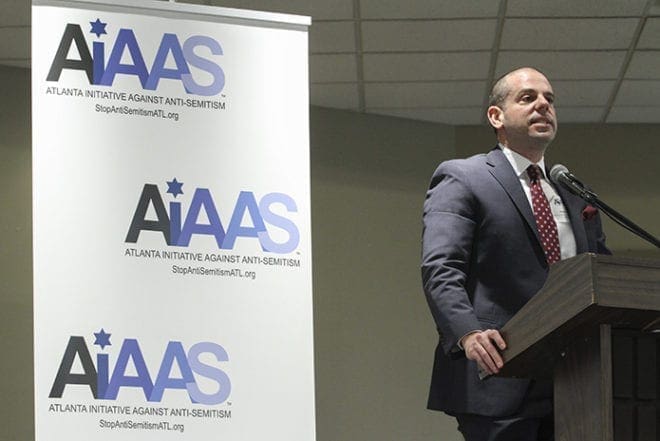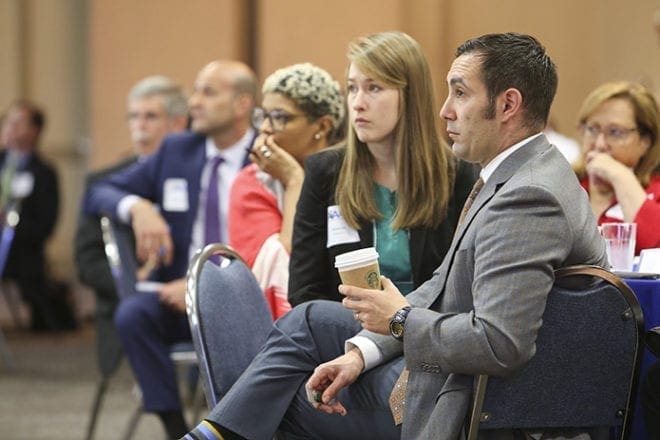(L-r) Msgr. Henry Gracz, pastor of Shrine of the Immaculate Conception, Atlanta, Soumaya Khalifa of the Islamic Speakers Bureau of Atlanta, and Judy Marx, executive director of the Interfaith Community Initiatives, Atlanta, participate with others in the second of two table discussions, which took place at the Atlanta Initiative Against Anti-Semitism’s March 30 leadership forum on anti-Semitism. Photo By Michael Alexander
Sandy Springs
Many sectors of Atlanta community heed call to combat anti-Semitism
By NICHOLE GOLDEN, Staff Writer | Published April 6, 2017
SANDY SPRINGS—Members of the Catholic community participated in the first Atlanta leadership forum on anti-Semitism March 30 at Temple Emanu-El.
Leaders representing 150 religious, civic and business organizations across Atlanta, in addition to law enforcement agencies, attended the forum. The Atlanta Initiative Against Anti-Semitism co-hosted the event with the Anti-Defamation League and the American Jewish Committee.
A group of Jewish women formed AIAAS in February, organizing the forum within a few weeks’ time. The women became concerned by a lack of public outcry and action over increasing acts of anti-Semitism and initiated the grassroots effort.
Lauren Menis, founding partner, welcomed participants to the forum.
“We cannot be complacent in the face of anti-Semitism or any other forms of hate,” said Menis. “We are here today with a message of hope—a message that when we stand together in solidarity, we are strong, we are powerful and we can effect change.”
Msgr. Henry Gracz, pastor of the Shrine of the Immaculate Conception in Atlanta, and Paula Gwynn Grant, director of communications for the Archdiocese of Atlanta, attended on behalf of Archbishop Wilton D. Gregory.
Father Tamiru Atraga, parochial vicar at Holy Spirit Church in Atlanta, and Kim Schulman, parish director of communications and a Holy Spirit Preparatory School parent, also took part.

Jared Powers, CEO of the Marcus Jewish Community Center of Atlanta, speaks of the show of support from the community after the center received multiple bomb threats. Photo By Michael Alexander
In his more than five decades as a priest, Msgr. Gracz has worked with and served groups often at the “top of the hate list,” including blacks, Jews and Catholics.
“When one suffers, we’re all going to suffer,” he said.
Msgr. Gracz said the forum was a great experience and involved listening to the powerful stories of his tablemates.
“It was overwhelming,” he said about the cross section of representatives.
Muslim and Protestant leaders, educators, members of the Hispanic community, the Carter Center, and major corporations sent delegates. The roundtable discussion was productive with actions proposed, noted Msgr. Gracz.
“We realized one of the main causes of hate in our culture is fear,” he said. “Our first action was to identify the fears and then build relationships.”
While ministering at Grady Hospital, the pastor always makes it a point to say hello to people whose attire indicates they are of the Islamic faith.
“They’re almost always surprised,” he said.
At the shrine, the parish community uses outreach and speaker programs to learn more about others and offers a welcoming environment. Msgr. Gracz provided a simple example of being accepting.
“We’ve had banners on our church for weeks—‘refugees and migrants welcome,’” he said.
Atlanta JCC received threats
Visitors to the temple were greeted by friendly faces, but also layers of tight security, illustrating precautions needed in the face of increasing threats against the Jewish community since the beginning of 2017.
Schulman found the level of security sobering.
“This is the world the Jewish community lives in now,” said Schulman. “It wasn’t until I was on the property that I ‘got it.’ The organizers were taking no chances.”
She and Father Atraga were greeted warmly and thanked many times for participating. After a quick ice-breaker at Schulman’s table, the discussion focused on what their communities were doing to combat hate overall.
“I have to say, I found that question hard to answer. We do so many wonderful things at my parish and children’s school,” said Schulman. “We try to live out the Gospel. But are we specifically doing something to combat hate? I’m not so sure that we are.”
Schulman said she and Father Atraga left the forum with more tangible ideas for acting against hate to share with the church and school.
Jared Powers, chief executive officer of the Marcus Jewish Community Center of Atlanta, spoke briefly about bomb threats made against the center in recent months.
“As I have said before, we will not let these threats deter us from the responsibilities we have to be the safe, welcoming, inclusive and diverse communal town square for the 60,000 people that walk through our door each year,” said Powers.
While the threats were disheartening, Powers focused on the support the community received in the aftermath. The JCC received positive emails, Facebook likes, and postcard messages from around the world, including one that read, “The opposite of love is not hate, it is indifference, and we are not indifferent. We stand with you in solidarity.”
Jewish immigrants in Atlanta formed the vibrant center 100 years ago.
Powers said a local Muslim leader offered to send people to stand guard at the center, even after his own mosque was threatened.
“People all over the community stood by our side,” said Powers. “Please don’t let the lesson that you leave with today be about hate because that’s not what I learned from this at all. What I learned was that how in the face of hate, the love and the friendship of others begins to shine through.”
ADL seeks Georgia hate crime law
Shelley Rose, interim regional director of the Anti-Defamation League, provided an overview of the rash of threats.
Rose indicated that since January, there have been 165 threats against Jewish community centers, day schools and ADL offices in the United States. Vandals have desecrated Jewish cemeteries in Philadelphia, St. Louis and Rochester, New York.

(Foreground to background) Dov Wilker, regional director of the American Jewish Committee of Atlanta, Gloria Cox of Chick-fil-A and Willae Ivory of NCR, listen to the anti-hate presentation by Shelley Rose, interim regional director of the Anti-Defamation League, one of the co-sponsors of the event, along with the American Jewish Committee. Photo By Michael Alexander
In late March, a synagogue in Chattanooga received a threatening voice mail, said Rose.
“We need to all work together in order to fight what’s going on in the country today,” she said.
Two arrests have been made, one in Israel on March 23 of a 19-year-old who holds dual American and Israeli citizenship and is accused of making many threats against Jewish institutions, including the Marcus JCC in Atlanta, using technology to disguise the origin of the threats. Another arrest was of a St. Louis man allegedly trying to incriminate a former girlfriend by making threats against eight or more Jewish institutions.
Rose emphasized that it’s not only Jews being targeted.
“In an area that really concerns me, we are seeing this hate trickle down to our schools, middle schools, high schools, even elementary schools, where swastikas are being posted, where racist graffiti, anti-gay slurs and anti-immigrant rhetoric is being spewed,” she said.
She said anyone wanting to change the environment can help support hate crime legislation and learn more about the ADL’s educational resources for parents and teachers.
“Georgia is one of only five states that does not have a hate crime law,” said Rose. “We need to have hate crime legislation passed in Georgia.”
The ADL has also been working in the area of “cyber-hate.”
“That has been a growing concern. We see a proliferation of hate on Facebook, on Twitter, on a number of different social media posting sites,” said Rose.
They work to address this by partnering with internet service providers and social media platforms, urging them to adopt hate speech policies in their terms of service and to respond when posts violate the policies.
The message should be that “we want to create a culture of respect. We want to be allies for each other,” said Rose. “We need to speak out whenever we see hate raise its head.”
Dov Wilker, regional director, American Jewish Committee of Atlanta, discussed developing strategic partnerships to combat anti-Semitism.
Anti-Semitism can arise anywhere that misconceptions exist, including “within the Jewish community,” noted Wilker.
Combating the problem means working ceaselessly to strengthen relationships.
“It’s an American problem,” he said about acts of anti-Semitism. “We need to denounce them in partnership.”